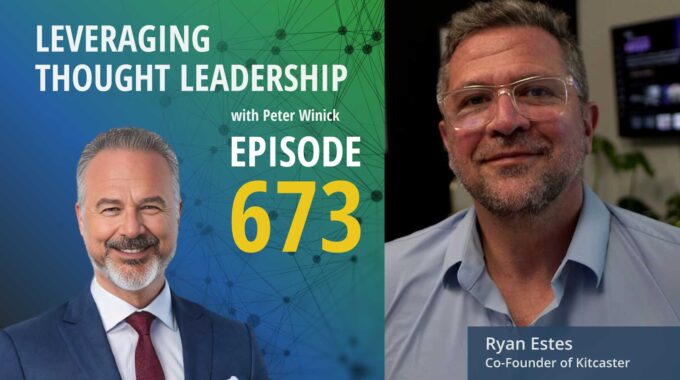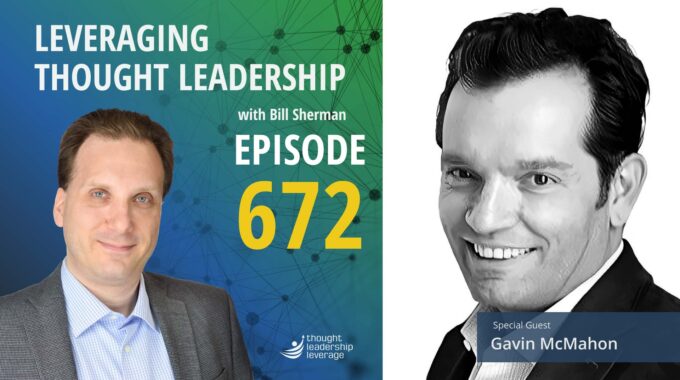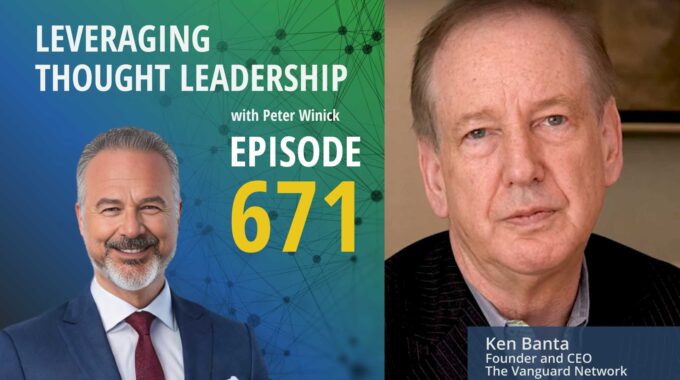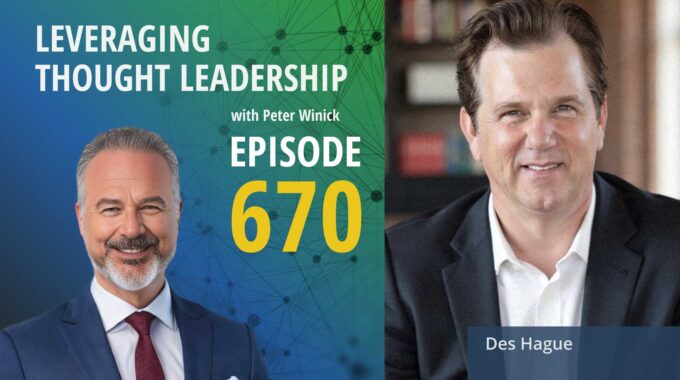Founder-led marketing, podcast strategy, and the art of authentic conversation What makes a podcast truly…
Leveraging Thought Leadership With Peter Winick – Episode 8 – Stever Robbins
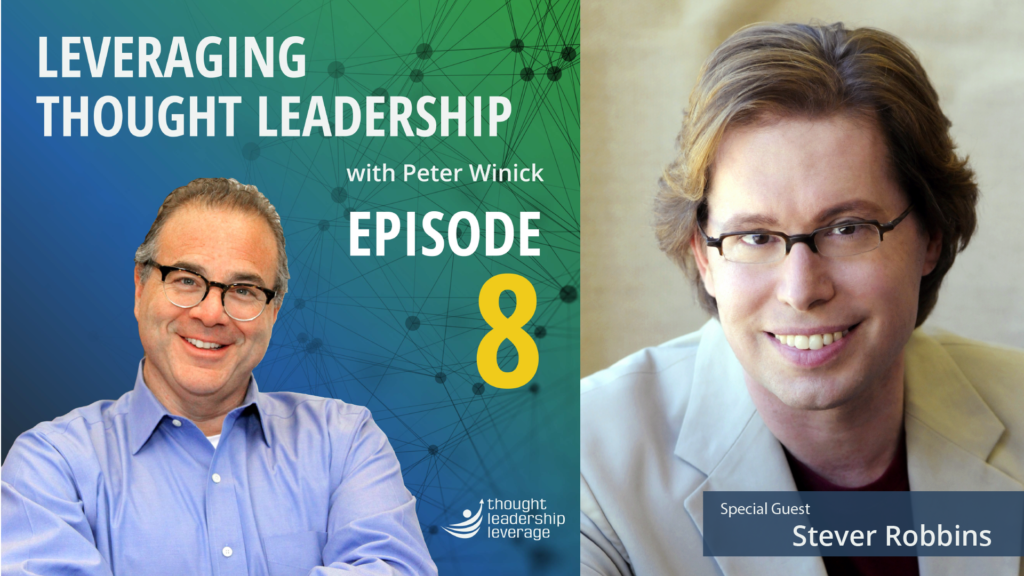
Do you have deep expertise? Does your thought leadership show it, and can your content teach it?
Stever Robbins is a serial entrepreneur, top-10 iTunes podcaster, and productivity expert. He co-founded the early internet success story FTP Software, served as COO of Building Blocks Interactive, CEO of JobTacToe, and currently runs Get-it-Done Groups, helping people make extreme progress on important projects and habits.
Listen in as Peter and Stever focus on an essential skill every thought leader needs – expertise. Stever’s wide array of talents and extensive podcasting experience shine through as he shares stories, tips, and insights about gaining and sharing expertise.
If you need a strategy to bring your thought leadership to market, Thought Leadership Leverage can assist you! Contact us for more information. In addition, we can help you implement marketing, research, and sales. Let us help you so you can devote yourself to what you do best.
Transcript
Peter Winick Welcome, welcome, welcome. This is Peter Winick and welcome to episode eight of Leveraging Thought Leadership. With me Peter Winick. I’m the founder and CEO of Thought Leadership Leverage and I’m delighted to have an old friend with me today. Steve. Robin, stay close here.
Stever Robbins Hello Peter.
Peter Winick Great. Let me give everybody Steve’s credentials, if you will, because it’s impressive. And if I were to go through all of them, it would take quite a long time. I’ll just give you a highlight. So he’s an executive coach and a communication consultants. He’s a life hacker. He has helped organizational leaders at Harvard Business School develop a learning and leadership curriculum. His podcast is pretty world renowned. It’s called the Get It Done Podcast. The Stever is the Get It Done guy, and it’s spent. Number one, it’s been at the number one slot on iTunes multiple times. He’s been a repeat commentator on CNN. He’s been interviewing The Wall Street Journal, NBC Nightly News, New York Times, ABC News. He’s a Harvard Business School grad. He’s an MIT grad, and he’s an all around good guy. So, Steve, are welcome. Welcome, and thanks for joining us very much.
Stever Robbins So I hear that and I keep thinking I wish I were me.
Peter Winick Yeah, exactly. Exactly. You just pretend it’s your obituary and you’re the star of the show, if you prefer. Whatever. Whatever. It doesn’t for you. So you’ve you’re interesting. You’ve got lots and lots of things and ideas and concepts, etc.. Walk us through really briefly, Steve, our world meaning the content and the thought leadership and the ideas that you have that you have out in the world and what you’re doing to monetize those, what does that look like?
Stever Robbins Sure. Well, and I’m going to divide that into two things. Firstly, what are the content that is out there? And the second, what is the monetization rate? I am I am I aspired as a teenager to be a renaissance man, and I’m pretty smart and I suspect I’m at the very, very highest functioning end of the autistic spectrum, which basically means that I can hyper focus to learn something as long and as deeply as I need to, to be able to learn it, as long as it’s something that I am intrinsically interested in. So I actually have four areas of expertise, and I don’t use the word expertise to mean general knowledge. I use the word expertise to mean ability to produce results at at the hopefully the expert level, but certainly the far above average level.
Peter Winick So let me just let me pause on that before I get to the four. That’s a brilliant definition because I think part of what people need to do to be successful in this space is to be an expert, not a generalist, because there are a million people out there blabbering about leadership or sales or whatever, but they take you through it at the level that’s so basic, so airline magazine level. I think the fact that you’ve defined expertise and then underneath, that’s it. These are the four areas that I actually have some expertise in is brilliant. So thank you for that.
Stever Robbins Thank you. Well, one of the things that I use as a hallmark for expertise is my experience is that experts make distinctions about their field of expertise that non-experts don’t. So if you’re talking to someone who is an expert at well, I’ll use computer programing as an example and you say to them, tell me about some computer program that you wrote. A non-expert might say, I wrote this program that did A, B and C, but an expert might say, I wrote a program that did A, B and C, but these are the cases where it wouldn’t be able to cope. And these are the underlying assumptions about the world that have to be true in order for this program to work.
Peter Winick Got it.
Stever Robbins So they’re making more distinctions about something than a non-expert is or different distinctions sometimes are so evasive. So over the course of my of my life and I am a lot older than I look if you’ve seen pictures of me. But I love that there are there are four areas that I really have something to add. One is computer programing. Two is productivity. And that is largely as a result of the Get It Done Guy podcast, which started as a hobby and became this major thing. Three is leadership. And this is a combination of the leadership models that I learned at Harvard Business School and later helped to integrate into curriculum. But it has since been augmented with a lot of background knowledge that I have from psychology and cognitive science. So my model of leadership, although based on a lot of models that are out there, is has a number of unique elements that come from other fields. And that also leads me to my fourth area of expertise, which is I would call it applied cognitive science is I’m very good at understanding subtleties of how people think and how cognition works, and then applying those in areas where where no one else is thought to apply them to be able to boost people’s performance in those areas.
Peter Winick Got it. So the first comment I would make just across the four is, as my clients could attest, one of the things that that I push hard for is to be the X guy or gal. That the fact that you’re a Renaissance man is great. The fact that you’ve got this deep expertise in four is great, and it’s probably connected to the fact that you’re significantly smarter than the average bear, but the recipient on the other side, the consumer, the client, the buyer is probably not going to remember steeper is the four things like the get a done guy as an overarching brand doesn’t cover all the things that you could talk about. But that’s a good example of solve for X because that ties to productivity, it could connect to leadership, etc.. But I think, you know, part of what many thought leaders and experts struggle is the fact struggle with is the fact they have so many passion, so many things that they have above average expertise in and the market. It’s hard for the market to remember more than one thing about an individual, an entity or an organization’s.
Stever Robbins I would even like to signal boost that to the extent that I can. If you were to ask me what has been the number one thing that has held me back in business, it would be the fact that I have four areas of expertise. If I have one area that I’m really serious with that I mean, I have come to identify, this is probably my number one biggest, biggest roadblock between me and where I want to be, because what happens is, is I have number one. Any time I think, okay, I’m just going to focus on area X and have that be what I what I bring everything else around. Some part of my brain goes. But wait. You also have area Y that isn’t making it into this mix. Well, you can’t abandon it.
Peter Winick And that’s the curse of the creative. Whether it’s A11 part, one part curiosity, one part someone that’s committed to lifelong learning is sticking to one thing you know, is not fun, is not engaging, is not exciting. But you have to separate the church and state of the intellectual curiosity, the thoughtfulness and the business side. So let’s move to the business side and tell me one, tell me what a profile client or four looks like in this case and how easy have you made it for me to give you money if I fit into those categories? What do you sell?
Stever Robbins Are what I sell right now primarily is executive coaching, which is one on one, working with people to solve their problems and get them unstuck, or if they are unstuck. Help them figure out how to magnify their vision of the future and tie it all to results. I am not a theorist. I am not someone who says Visualize. I am someone who says, Let’s understand what your big picture is and then let’s connect that big picture with everything you do every day so that you actually achieve the stuff that you’re doing. I’ve been doing this primarily as an executive coach, alternating with bouts of entrepreneurship, where I’ve actually stepped into operating roles with companies. And the obvious revenue model there is I get paid and then also bouts in academia both at Harvard Business School and at Babson College, helping to do curriculum design and or strategy for the school. So I’ve had so part of it again, part of the issue is, is success as a thought leader, I believe requires focus, both in terms of your expertise and also in terms of essentially how you spend your time.
Peter Winick Yeah. So you’ve got executive coaching is one line of business and you get paid for your time and we define the outcome and deliverable, etc.. What are the other pieces of the podcast, which is actually a world renowned podcast? And that’s been going yes, I mean, it seems like you started that before the Internet started. A long, long way to get it done got better.
Stever Robbins Just for the record, Peter, I have been using the Internet since 1976, so I guarantee you I was there when the internet was getting started and the get it done guy wasn’t there quite yet. I’ve been doing it for a little over ten years and it started purely as a hobby. I wanted and I wanted a creative outlet where I could talk about things that weren’t related to my coaching and strategy type work. So I chose personal productivity mainly because I was doing it with most of my clients anyway, not because they wanted productivity, but because in order for them to get the time to be able to spend four hours a week, say, doing strategic thinking and working on strategic issues, we needed to clear out their schedule. So I was like, okay, first will make you productive so that we have time to do everything else. Well, the podcast took off.
Peter Winick And great, so, so it came. But, but it sounds like it came out of a curiosity, something you were pondering, and then you decided to turn it into a podcast and that was that because it gave you sort of the forcing mechanism of having a deliverable per se?
Stever Robbins I wish that I could say yes to that, but I can’t. No, I I’m a little bit of a ham and I like performing. Okay. When podcasts first hit the scene, I was like, I can do that. And so I started a podcast and this this was ten years ago when podcasts were very new. So because they were very new, it enabled me to get something of a profile that I might not have been able to get otherwise. Also, I teamed up very early on. There was a woman is a woman. Her name is Minyon Fogarty, who started Grammar Girl, the podcast, and she very quickly saw that it became a hot property and she created a channel which had several hosts. And I approached her because I loved her style. I thought she was just fabulous. And I approached her and said, I’d like to be your business podcaster. And that was the genesis to get it done. Got it.
Peter Winick So underneath that, I don’t I don’t know if it’s clear to folks what the revenue model is there. So is there or explain to us what, if anything, a revenue model is for podcasts. So for example, for my podcast, there is no advertising based revenue. I’m doing it to get the message out. I’m doing it to get the brand out. I’m doing it. So people that are curious about potentially working with Thought Leadership Leverage can go and listen to some things and hear in directly from themselves what we’re about. So what What’s the business side of the Going to Town Guy podcast?
Stever Robbins Well, we get it done by podcast in particular. The feed is owned by Macmillan Publishing. That was the Faustian side of the bargain of teaming up with Grammar Girl is I became part of her channel when she sold her channel to Macmillan. Macmillan are now I Macmillan is who makes most of the revenue and they make it through advertising. I think, by the way, that’s a bad way to make revenue. I think it’s probably the least leveraged way that they could be, that they could be making revenue. But try negotiating with a corporation in terms of changing the product mix. But I’ll tell you, I believe that podcast podcasts are very a very interesting vehicle. A lot of people think that starting a podcast will get them a larger audience. And with 800,000 podcasts coming online a year. Unless you are lucky enough to somehow end up in the new and notable section, the chances that you will suddenly get a large audience makes no sense. But what a podcast is great for is connecting with your existing audience and again, giving a much deeper connection or a much more nuanced, which over time will allow you, you know, if your audience is one, that you have a separate revenue stream for either consulting or products. A podcast is a fabulous way to interact and create a really deep emotional connection with your audience that you can’t really do in writing and you can’t really do any other way because it’s got the personal thing right. The other thing about podcasts, by the way, that most people don’t know, we’ve studied this a lot of the Quick and Dirty Tips Network people mostly consume podcasts on the treadmill at the gym and while they’re commuting. So, you know, you’re going to have a revenue model that counts. On people jumping off the podcast and immediately answering some call to action. It isn’t going to happen because people have to finish their 40 minute workout. So they’re either.
Peter Winick Okay. Right? So they’re either sweaty or frustrated. So your audience is either out of breath or flipping someone, the bird or something is on their way to work. So it’s something to think about. So we’ve got executive coaching, we’ve got the podcast. How else are you monetizing your content? You’re welcome.
Stever Robbins So, so this is the couple. I have two books. I have a book called Why Can’t I Remember This? It takes a lot more than attitude to lead a stellar organization, and that is a book about leadership, and it is both strategic and tactical in terms of saying here are elements, here are behavioral elements that you need to adopt in order to accomplish these strategic goals as a leader. It’s a collection of essays that. Right? It’s based on a column that I used to write for the Harvard for the Harvard Business School Working Knowledge website. I had a practitioner’s column. Everyone else was research. And I was like, Here’s how to put it into practice. And so that’s what the book is based on. And then the second book is based on my podcast, and that’s the Get It Done guys nine Steps to Work Less and Do More. And that’s just hardcore productivity. That’s, you know, here is how to do stuff to be better at you’re better at what you’re doing over the course of a day.
Peter Winick Yeah. But the business model there is you have books and I would imagine if you’re anything like anybody, any of the 99.9% of authors that I know, the amount of revenue generated from the books, you know, pays for a lot.
Stever Robbins If if I manage to sell ten times as many books as a normal bestseller, I might make enough money to actually pay for the time it took me to write the book. I think, you know, people seem to have this belief that authors make a huge amount of money. Even J.K. Rowling, who is who I believe by some accounts may be the most successful author in the history of the human race, financially made most of her money through the movies and the licensing deals, not through the books themselves.
Peter Winick And those books sold millions and millions and millions of copies. So anyway, so we’ve got the we’ve got the coaching, we’ve got the podcasts, we’ve got some books. What are the other things that folks can buy? How else can I pay for your expertise?
Stever Robbins Well, because I am a generalist and or I’m a generalist slash multi expert, however you want to think about it. I have also done things like been on boards of advisors where I become an ongoing advisor. You can think of it as coaching, except it’s a little bit more of a governance role. And I’ve done that with companies and gotten stock in return and also gotten fees. So that gives me a somewhat unusual form of monetizing, which is essentially risk equity, but it’s risk equity and opportunities that I believe in because I wouldn’t take it in that form for something I didn’t think was a really good idea. It had real potential.
Peter Winick And then so, so yeah.
Stever Robbins And then I have to I have two things that I’m working on right now. Excuse me. One of them is directly it’s a direct spin off of the productivity work. And these are called Get it Done groups. And this again, this didn’t come about as a long term strategic plan. This came about because I was having trouble getting some work done on something. And I was talking to a friend and I said, this is ridiculous. You know, what I need is a manager who simply looks over my to do list and says, Hey, you know, none of these things on your to do list today are actually really. Added to the high leverage tasks of your number one goal. These are things that are fun to do or entertaining, but not critical. And my friend, who’s also self-employed, said, Man, I could use that, too. And then we kind of looked at each other. And I talked to a few more of my friends who were self-employed. And before I knew it, every self-employed person I know was saying, my gosh, we need managers, but we need nice, friendly managers, you know? So essentially, I am piloting this starting this coming Monday and I call them Get it Done groups. And I have thought very long and very hard about what is the absolute minimum interaction you could use to get the maximum leverage in terms of accomplishing things that you’ve been putting off or that you’ve been procrastinating or that you haven’t been getting to from for one reason or another. And what’s interesting is, although what we actually do is going to be very simple behaviorally, if everything comes down to a single ten minute check in the day.
Peter Winick The organization of what is the right check in, how do you do it? Who do you do it with and what do you do when you notice that something isn’t getting done that you want done? Draws on all of the skills I’ve talked about so far.
Stever Robbins And got it. And I believe solutions, right? So it’s ultimately a derivative product, if you will, from the thinking processes, models, methodologies, etc.. I hope we get it done. And then your application is some sort of an accountability group. Hey, here’s a bunch of entrepreneurs and we don’t have a boss over our head. Why don’t we take that roll on for each other to hold each other to account on the things that we want to get done. So it’s using that in a different manner than something that’s one dimensional, like listening to a podcast, reading a book. So that’s a monetization piece.
Peter Winick But let me let me ask you this question.
Stever Robbins I do want to point out one more thing about that is it’s not just the productivity, because part and this is this was the insight that I had to form these is that people seem to believe that whether they get something done or not is is always a function of what am I doing moment to moment. And what I what I have concluded, at least for now, we’ll see if I change. The conclusion is that they’re actually multiple levels in your business that have to be aligned. Some of them are strategic, some of them are in business process and some of them are personal productivity. And any one level you can do work on. And if you don’t do work on the other ones, you can still get tripped up by those guys. So what makes this unusual is that it actually integrates both my big picture work that I’ve done and my detailed work. But you don’t necessarily know that all you hopefully the way that it will manifest is all you’ll know is wow. For some reason when I do it this way with these people in this context, I get really amazing results. And you don’t have to know that the reason you’re getting amazing results is because in order to do your check in, you had to align a bunch of stuff, right? You had to ask certain strategic questions, etc..
Peter Winick So the tools aren’t what people care about. It’s the problem. And then the outcomes, how you how you’re getting them there in terms of this alignment of the multiple things that you talked about, whether I have a level of awareness of that or not isn’t really the point.
Stever Robbins No, as far as I’m concerned, it’s all about outcomes.
Peter Winick I love it. Okay. So let me ask you this out there today. Listening, I hope is. Stever. 15, 20 years ago, maybe 25 years ago. Young, super smart, full of passion and energy and having the potential to have multiple expertise is or I don’t know with the plural expertise is multi expert whatever give that person. Maybe the young Stever some advice. What would you do? What would you not do? What would you do? That might be difficult and counterintuitive, but just give that person two minutes of advice just before the plane lands. Right? We’re sitting next on the plane. Person man, you’re the you’re the get it done guy. I’m. I’m the bloodline person, man. What would you do?
Stever Robbins Number one, spend a year doing sales, Get yourself into a job where the only thing you’re the only thing you’re concentrating on 125,000% is understanding why people buy things, what they buy, and how to either disqualify them or lead them through a sales process. Because it doesn’t matter how phenomenal and amazing your stuff is, if you can’t make it relevant for people and you can’t make it relevant in a way where they want to buy it, they won’t buy it. They’ll say, Wow, you’re interesting and you’re fascinating. They will not, however, shell out money. And that’s so that is so unbelievably important. And that’s the number one thing I come from MIT, where no one ever thinks about sales. And some of the products that I have seen that have existed and then ceased to exist because they didn’t have the sales, then I’m like, I think these are things that would that would revolutionize the world in ways that make Facebook recruiting.
Peter Winick So number one, learn how to sell and not just read a book. Spend a year of your life selling and understanding the psychology, the emotions, the process, and what it takes to get someone to do more than just lean into an idea. But to back up that, to validate that with real dollars. That’s fascinating. Next, what else would you tell them?
Stever Robbins Number two is, is whenever someone tells you need to understand your customer’s needs, put your fingers in your ears and go, Nina. Nina! Nina, Until they stop talking. You do not need to understand your customer’s needs. You need to understand your customers wants. And it took me it took me two decades to understand the difference.
Peter Winick And they’ll pay a lot more for a won’t.
Stever Robbins Yeah, well, they won’t pay for a need and they will only pay for once. And what used to happen is someone would come to me and say, you know, I, I want to re inspire trust in my I want to I want to re inspire trust. My employees don’t trust me. I want them to trust me. And I would think, well, what you actually need is to learn how to behave trustworthy in the first place. And by the way, you can’t regain trust. I’ve not. I have yet to find an example of where that’s ever happened. So. So I would say, sorry, I can’t help God. And I’m like, what I should have said was, okay, what you want is to regain trust. Hire me, will figure out what you can do instead because you’re not going to regain trust.
Peter Winick And the last thing that you would tell the young, that young, brilliant, potential multi expert.
Stever Robbins Yep. And this is something that I did end up doing, although not in quite not in quite the way I would tell myself. I build lots and lots of relationships and find ways not just to have good, close, emotional, trusting relationships with people, but find lots of opportunities to build things with other people. Because by the time you are in your early 30s, you’re starting to shift to the point in your career where you don’t get called in on things because you submit a resume. You get called in on things because people know you and like to work with you. And one of the weird downsides of being an unbelievably productive genius type person, and I know a lot of those people is that is that you don’t get perceived you get perceived as the person who produces amazing stuff. You don’t get perceived as the person people want to be on a team with.
Peter Winick Right. Right. You’re seen as the lone wolf. So. So it’s that right combination of knowledge and network. And by forcing yourself to build the network and collaborate team, you don’t want to be known as that, that sort of lone wolf. So that’s great insight. Great expertise. I’m so glad that we had you on today for our eighth episode. So we’re still in the single digits. And I wanted to make sure that I had you on as one of my first ten because I knew you’d have a lot to add today. So I thank you for your time. I appreciate you.
Stever Robbins And my pleasure. Thank you very much, Peter.
Peter Winick Thanks so much. To learn more about Thought Leadership Leverage, please visit our Web site at ThoughtLeadershipLeverage.com to reach me directly. Feel free to email me at Peter at ThoughtLeadershipLeverage.com. And please subscribe to Leveraging Thought Leadership on iTunes or your favorite podcast app to get your weekly episode automatically.


